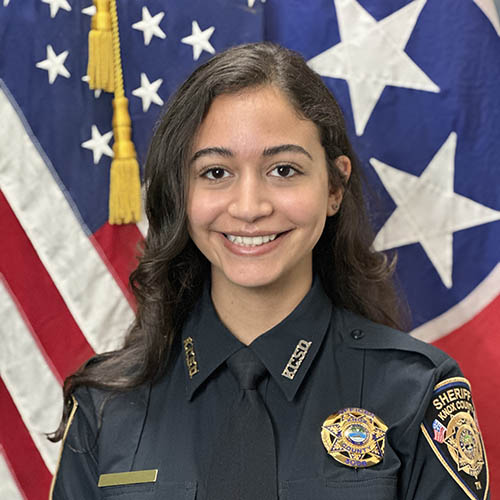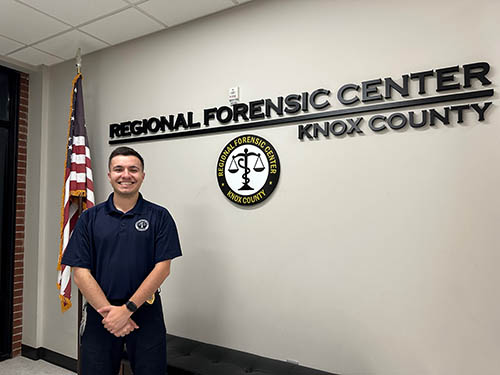Not CSI: UT Offers Real Forensic Experience
Films and television programs make processing crime scenes and investigating deaths look fascinating, but those who study anthropology at the University of Tennessee, Knoxville, can learn firsthand the skills and the mindset vital to those careers.
Courses that provide hands-on experience handling skeletal remains—as well as opportunities in the local community to see professionals in action—ensure that new graduates are ready for the work.
“Students can complete courses that actually take place at the Body Farm while several other classes are connected to work that occurs at that facility,” said Teaching Professor Joanne Devlin, director of undergraduate studies for the Department of Anthropology and associate director of the Forensic Anthropology Center. “These opportunities are absolutely unique to UT’s undergraduate program in anthropology.”

Hana Hafez (’23), was hired as a forensic technician with the Knox County Sheriff’s Office (KCSO) days after earning her BA in anthropology with a forensic concentration and a minor in sociology with a criminal justice concentration.
“Growing up, I’d always been fascinated by crime scenes and solving crimes using different tools and the science involved in it,” she said. At UT, Hafez realized she wanted to work in the field, not the lab. “It’s not like the movies at all.”
“Whenever people think of forensics, they just think of forensic scientists in a lab testing blood samples, DNA, and stuff like that,” she said. “As forensic techs, we go to the crime scene itself. We photograph the whole scene; we collect evidence. We try to investigate and figure out exactly what happened at the scene. Whatever we collect we send it to the forensic scientists to test DNA and blood to help solve the case.”
“It’s definitely a messy job,” she continued. “You’re getting into dumpsters; you’re getting under cars. Sometimes you go onto roofs, and you get dirty.”
“It is an interesting job,” she said. “You get to learn a lot about people.”
Matt Sullivan (’24) also graduated with a forensic concentration in anthropology and knew early on that he wanted to work in the field, not a lab. Shortly after graduation, the Knox County Regional Forensic Center (RFC) hired him as a medicolegal death investigator, working alongside investigators he had shadowed on the job.
Unparalleled Forensic Experience

Sullivan transferred to UT after his sophomore year of college. “The opportunities to work at the Bass Building and the Anthropology Research Facility (ARF) really excited me,” Sullivan said. “I would get an experience that I wouldn’t get anywhere else.”
UT’s Forensic Anthropology Center (FAC) is internationally renowned for its research on human decomposition and modern human variation. The ARF—better known as the Body Farm—and the university’s Donated Skeletal Collection are used not only by faculty and students but professional law enforcement and other organizations from around the world.
Hafez, who transferred to the university after earning an associate’s degree in criminal justice from Pellissippi State Community College, also found faculty and teaching assistants in UT’s Department of Anthropology passionate about their studies and eager to help students.
Her first course was Introduction to Biological Anthropology with Devlin. “The whole class fascinated me,” Hafez said.
Devlin also taught Scene of the Crime: Demystifying Forensic Science. “She taught us different stages of decomposition, blood spatters, fingerprinting—which is also what we do at the sheriff’s office, try to find fingerprints on scenes,” Hafez said. “Also, collection of DNA, preservation of evidence—all of these things I get to apply in every day that I go to work.”
The first time Hafez saw a dead body was at UT’s ARF, and while that was unsettling, she fell in love with the work. “Whenever the opportunity presented itself for me to volunteer there, I took it,” she said.
Classroom to Real World
Several courses allow UT anthropology students to gain hands-on experience.
At the start of Sullivan’s senior year, he took Anthropological Field Recovery, in which students learn how to document a scene and proper methods for skeletal recovery. “We were split into small groups, and it involved rotating roles every so often as the scribe, mapper, osteologist, and photographer,” he said. “That rotation ensured that we were involved in all aspects and strengthened ourselves in areas that we were weak in.”
Introduction to Forensic Anthropology teaches anthropological methods for estimating a biological profile of skeletal remains. “It covers identification methods and decomposition processes, which are important pieces of information that death investigators use on a daily basis,” Sullivan said.
As a Forensic Center Trainee in Anthropology students assist in the work of the FAC from logistics to research, with an emphasis on professional development.
Hafez and Sullivan said a Skeletal Processing course, preparing skeletal materials for the collection, also helped them in an osteology course, being better able to identify bone fragments. “Exposure to numerous remains every week helped me to see human variation and how different conditions and/or circumstances in life affected the skeleton,” Sullivan said.
The hands-on education that UT offers gives students critical exposure to the sights and smells of a scene before they advance into a career in death investigation, Sullivan said. It also provides depth on the resume of an anthropology major.
The courses teach skills that employers say are essential across fields of work, such as teamwork.
“Almost all of the forensic center courses required you to work in a group. It was imperative to work effortlessly together,” Sullivan said. “This directly translates to my career today,” he said. The 11 death investigators on his team must be able to access information from any case if a family or law enforcement official calls with questions. “Teamwork skills I developed at UT allowed me to effortlessly join the flow of the medical examiner’s office and help out my coworkers, who do the same with me.”
Courses in which professors discuss past casework and final projects centered on mock cases hone students’ critical thinking skills. “This forced me to consider all aspects of the circumstances that were given to me and come up with a plausible conclusion,” Sullivan said. “The feedback I was given taught me what I had to keep an eye out for.”
Now at work he must examine a scene and the person’s history, then use his training and comparisons with other cases to deduce what he thinks happened from all the potential scenarios. “It is important that I come to a logical conclusion, as I have to give accurate information to the pathologists I work with and the law enforcement agency that is investigating the case,” he said.
On the Job
With recommendations from his professors, Sullivan arranged a day of job shadowing at the end of the school year with the Knox County Regional Forensic Center. “I got a tour of the facility, heard about some interesting cases, and got to go out on one scene,” he said. “I wanted to know that at the end of the day I could do it.”
He shadowed the RFC death investigators three more days after that. “When it came time to interview with them for a job, they already knew my name, my face, my personality, and most importantly, they knew that I was interested in the work, plus that I could handle it,” Sullivan said.
The summer before her December graduation, Hafez served a monthlong internship with KCSO and observed crime scene technicians at work. “It was a great experience,” she said. “That’s how I figured out that I don’t want to be stuck in a lab. I want to go out there and be hands-on on scenes. This is what I want to do for the rest of my life.”
“They offered me a job right after I was done with the internship,” Hafez said.
By Amy Beth Miller